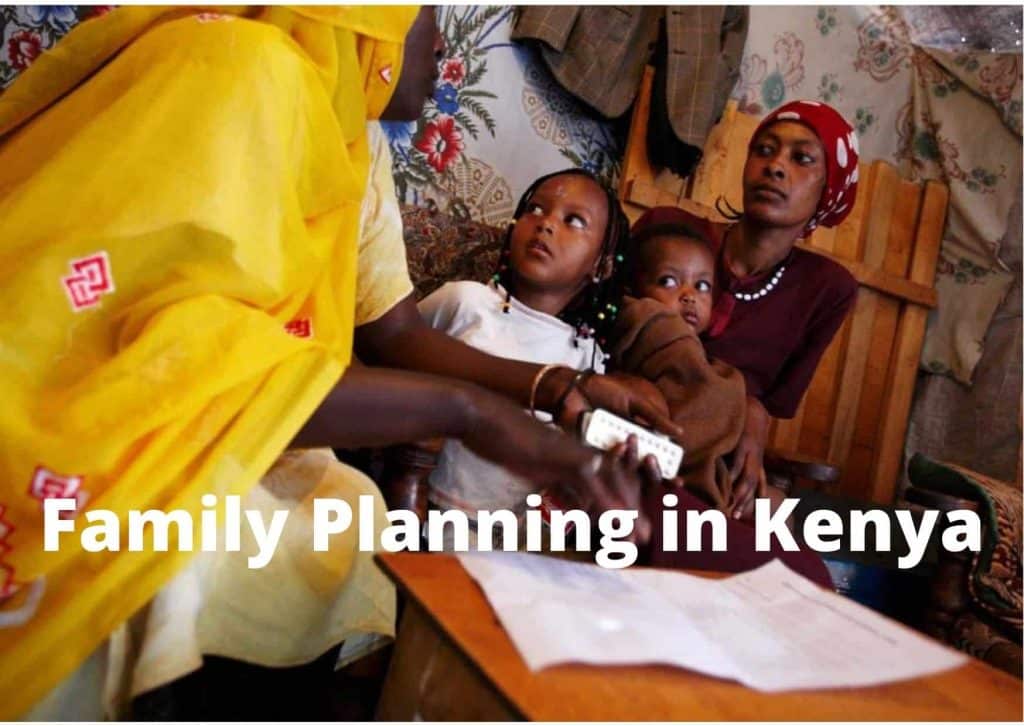In Kenya, family planning is essential for maintaining the health of women and children, but the rate of contraceptive usage typically falls short of the need in resource-constrained situations. Women who are sexually active but do not use any kind of contraception have a need for family planning that is not being satisfied. In Kenya, around 39% of reproductive-age women who are married utilize contemporary contraceptive methods, while another 26% have unmet family planning needs.
In spite of their desire to avoid pregnancy, some women may still find it difficult to get family planning services owing to medical reasons. This article is here to teach you more about family planning, its importance, how they cost, and other related things you need to know about family planning.
What is family planning, what is it all about?

Photo credit: WHO
Family planning is a method of restricting how many children a couple will have, as well as how far apart they will be born.
There are just 17% of married women now adopting contemporary family planning techniques. Women of childbearing age in low and moderate-income nations like Kenya wish to prevent becoming pregnant but do not use a contemporary contraception technique.
Importance of Family Planning
- Families who prepare ahead of time may lessen the financial and emotional burdens of becoming parents. More resources may be allocated to ensuring that fewer and healthier children have appropriate nutrition, clothing, shelter, and educational opportunities in families with fewer children.
- It reduces the load on the economy by reducing population growth.
- The use of barrier measures (condoms) in family planning may help prevent HIV and other sexually transmitted illnesses.
- Families with few kids are more likely to send their children to school, making it easier for parents to care for their families.
- Informed decisions concerning reproductive and sexual health are made possible because of this.
- In this way, unplanned pregnancies may be avoided, which reduces mother and newborn deaths.
Methods of Family Planning:
There are many methods of family planning, read below to find a suitable one you can practice.
Family planning methods that can be done naturally:
- Amenorrhea During Lactation (Exclusive breastfeeding)
- Calendar Method: The couple avoids pregnancy by abstaining or wearing a condom to avoid unprotected vaginal intercourse on the first and final anticipated fertile days.
- Fertility Awareness
- Withdrawal method: Removing the sperm from the woman’s body in an effort to prevent conception is one way of withdrawal.
Intermediate Methods
- Use of Contraceptive pills: The use of oral contraceptive pills prevents or slows the production of ovulation using oral contraceptive tablets. 5 days after unprotected intercourse is the cutoff date for the use of birth control pills.
- The use of Injectible contraceptives: To inhibit ovulation, injectable contraceptives thicken the cervical mucus to prevent sperm from contacting the egg.
- Creating Obstacles
- a fourth patch
- Sympto Thermal Method: Pregnancy can be prevented by the avoidance of unprotected vaginal intercourse during the most fertile time of the month.
- Rings for the vagina
Methods that take a longer time
- Contraceptive Implant: When sperm and egg do not meet, ovulation is prevented by thickening the cervical mucus.
- IUCD – Intrauterine Contraceptive Device: Thickens the cervical mucus to prevent sperm and egg from meeting.
Methods that can be permanent
- Both male and female sterilization ( Tubal ligation).
- Permanent protection against pregnancy is provided via a surgical procedure known as sterilization. Men and women who don’t want any more children may use this strategy. Sperm is prevented from entering the ejaculated semen of males who have been sterilized
Encouragement of male planning in the family
As part of their role in family planning, men may advise their spouses on the importance of contraception and encourage and support them in their choice of contraceptives.
This gives males the opportunity to take charge of family planning.
Family planning can help save the lives of wives and kids while also reducing poverty, protecting the environment, and enabling families to provide for the needs of their children by providing them with food, clothing, and an education.
Prices for family planning in Kenya
- Total Abstinence from sex: This method is free
- Implanon, a popular implant is the most often utilized. It costs roughly KSh 2000 to obtain an implant (including a physical examination, implant consultation, and implant insertion). KSh 1500 is the cost of removal. In Kenya, removing a contraceptive implant might cost up to Ksh 150.
- Pills for oral contraceptives: KSh 150 a month. In Kenya, the cost of birth control tablets might vary widely.
- Free distribution of male condoms at family planning clinics is permitted. The price of a pack of condoms in Kenya ranges from KSh 10 to KSh 25 based just on brand and type.
- Family planning clinics may provide free female condoms to those who need them most. In Kenya, female condoms may cost as much as Ksh 120.
- In this method, you take your temperature every day to determine when you’ve begun ovulating, it is called the rhythm method. A thermometer is all you need. Kenyans pay Ksh 10 for a thermometer.
- Withdrawal method: this is completely free
- Contraceptive pills: Plan B, Postinor, postpill, and One-Step Levonorgestrel pills typically cost around KSh 150 for contraceptives or the morning-after pill.
- IUC method: An IUD may cost as much as KSh 3500 in Kenya, which includes the first medical checkup, the IUD, the implantation, and any necessary follow-up.
- Injectible Contraceptive: About Ksh 600 every three months is the cost of Injectible contraceptives like Depo-Provera (DMPA).
- Vasectomy: A method of long-term male sterilization. In Kenya, a vasectomy costs around Ksh 20,000.
- Tubal ligation: The tubal ligation procedure is a method of female permanent contraception. In Kenya, a tubal ligation procedure costs around Ksh 30,000.
In conclusion
A quarter of married or in a civil union women in Kenya says they want to postpone or stop having children and are using any kind of family planning approach.
Providers in urban Kenya are imposing significant impediments to supplying the injectable technique, which is especially popular with younger users. Injectable contraceptive availability is restricted by about two-fifths of suppliers in institutes, which may have major consequences for the use of this technique by young people.
A second key approach for preventing unwanted pregnancies and disease transmission for teenagers is the use of condoms, which we found to be restricted to those under the age of 21 in roughly 20% of pharmacies. There is also the issue of the parity limitation, which prevents certain women from using injectable contraception until after they have had one child.
However, due to injectables’ greater prevalence in urban Kenyans, the oral contraceptive pill’s lower minimum age restriction likely has less of an impact on the use of the pill by adolescents and young people.
